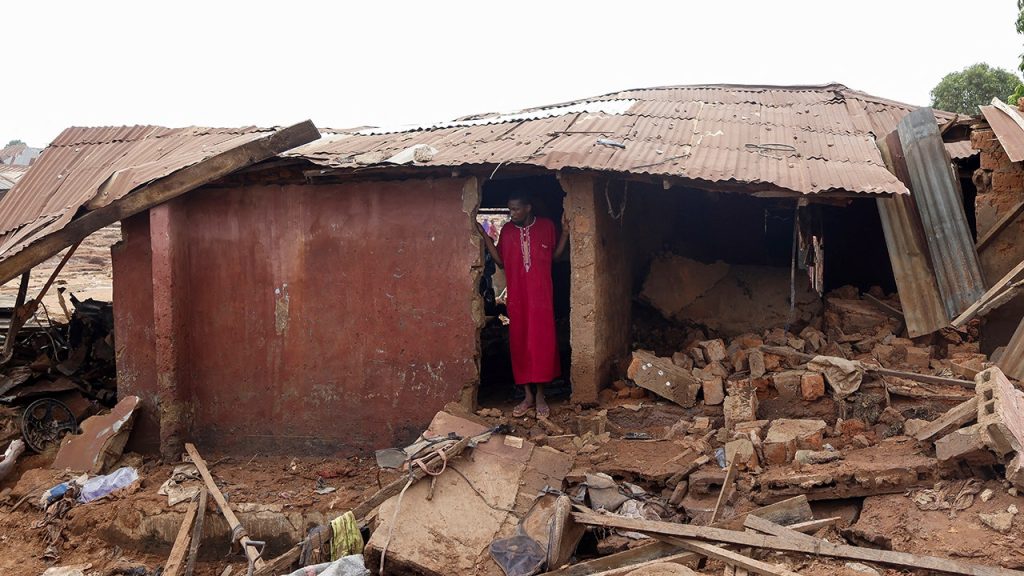Severe flooding in Mokwa, Niger State, Nigeria has resulted in the tragic loss of at least 111 lives, with officials fearing that the death toll may rise. The flooding, caused by unexpected torrential rains overnight, has led to extensive damage in a vital market town that connects northern farmers with southern traders. Local leaders are now calling for immediate construction of flood-control infrastructure to mitigate future disasters.
| Article Subheadings |
|---|
| 1) Overview of the Flooding Incident |
| 2) The Immediate Impact on the Community |
| 3) Long-Term Consequences of Climate Change |
| 4) Call for Infrastructure Improvements |
| 5) Previous Flooding Events and Current Needs |
Overview of the Flooding Incident
In the early hours of May 31, 2025, Mokwa, located over 180 miles west of Abuja, experienced an unprecedented flooding event following heavy rain that began after midnight. According to the Nigerian Hydrological Services Agency, the precise amount of rainfall has not been detailed, but it was sufficient to inundate neighborhoods and homes in the area. Residents from the surrounding communities, primarily agricultural, are now grappling with the consequences of this tragic event.
Local officials have confirmed that the death toll stood at 111, but further reports hinted that the number might escalate as search efforts continue. “More bodies have just been brought and are yet to be counted,” remarked spokesperson IIbrahim Audu Husseini from the Niger State Emergency Agency. His comments reflect the dire ongoing search and recovery operations.
The Immediate Impact on the Community
The immediate aftermath of the flood has left extensive damage to property and agriculture in Mokwa. According to residents, many households saw their stored agricultural produce destroyed.
“We lost many lives, and the properties, our farm produce. Those that have their storage have lost it,”
expressed local farmer Kazeem Muhammed. This expresses a grim reality for many households that depend on farming as their primary source of livelihood.
Videos circulating on social media show submerged streets and neighborhoods, with roofs barely visible above the floodwaters. Efforts to salvage belongings or rescue those trapped were made difficult as residents waded through waist-deep water.
Long-Term Consequences of Climate Change
The current flooding is viewed by many as a manifestation of broader climate change issues affecting Nigeria and the Sahel region more widely. Communities in northern Nigeria have been facing increased instances of extended dry spells followed by extreme rainfall during the brief wet season. The essential connection between climate change and these flooding events cannot be ignored as local agricultural practices become increasingly challenged by unpredictable weather.
The changing climate has amplified the frequency and severity of these floods, adding to the burden of already vulnerable populations. Many experts warn that the current agricultural strategies may not be sustainable in the face of such climatic volatility, potentially leading to food insecurity in the region.
Call for Infrastructure Improvements
In the face of such calamity, local leaders are urging the state government to construct flood-control infrastructure. The chairman of Mokwa local government, Jibril Muregi, stated that “this critical infrastructure is essential to mitigating future flood risks and protecting lives and property.” Efforts to establish effective flood-control mechanisms have been a longstanding demand from the Mokwa community, especially given the town’s role as a key market hub.
Local community leader Aliki Musa expressed frustration over the lack of preventive measures. “The water is like spiritual water which used to come but it’s seasonal. It can come now (and) it will reach another twenty years before coming again,” he remarked, depicting a misunderstanding of flood patterns that need addressing in local strategies.
Previous Flooding Events and Current Needs
In September 2024, a dam collapse and torrential rains in Maiduguri, in northeastern Nigeria, led to at least 30 deaths and displaced millions, exacerbating an already critical humanitarian crisis. The ongoing Boko Haram insurgency has further complicated emergency responses in afflicted areas, highlighting the necessity for comprehensive disaster management planning in Nigeria.
As Mokwa recovers from this latest tragedy, officials must consider lessons learned from previous flooding incidents. Data collection and effective risk assessments could prove crucial in informing future flood prevention strategies. Fostering community engagement in these discussions will also be key to ensuring that the local perspectives are incorporated into any plans moving forward.
| No. | Key Points |
|---|---|
| 1 | At least 111 confirmed deaths due to flooding in Mokwa |
| 2 | Local communities call for immediate flood-control infrastructure |
| 3 | Climate change contributing to increased rainfall and flooding |
| 4 | Residents experienced significant loss of homes and agricultural produce |
| 5 | Previous flooding incidents in Nigeria highlight ongoing humanitarian crises |
Summary
The flooding in Mokwa, Nigeria represents not only a natural disaster but also a significant human tragedy. As communities mourn the lives lost and the destruction of livelihoods, the urgent call for action toward infrastructural improvements is more pressing than ever. The fragile balance of climate and agriculture in the region highlights the need for comprehensive planning to avoid repeating such disasters in the future.
Frequently Asked Questions
Question: What are the immediate impacts of the flooding in Mokwa?
The immediate impacts include the tragic loss of lives, extensive damage to homes and agricultural produce, and disruption of local markets. Many residents are left struggling to recover from the destruction.
Question: How does climate change contribute to flooding events in Nigeria?
Climate change exacerbates weather patterns, leading to longer dry periods followed by sudden and intense rainfall. This unpredictability increases the likelihood of severe flooding during Nigeria’s brief wet season.
Question: What is being done to improve flood control in Mokwa?
Local leaders are advocating for the construction of flood-control infrastructure, which they deem vital for protecting lives and property and mitigating the risks of future flooding events.


